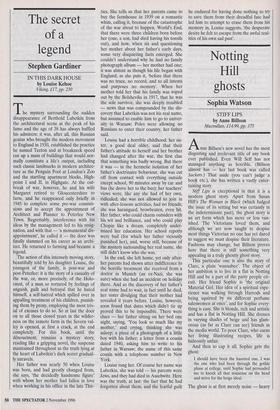The secret of a legend
Stephen Gardiner
IN THIS DARK HOUSE by Louise Kehoe Viking £17, pp. 230 The mystery surrounding the sudden disappearance of Berthold Lubetkin from the architectural scene at the peak of his fame and the age of 38 has always baffled his admirers: it was, after all, this Russian genius who brought the modern movement to England in 1930, established the practice he named Tecton and at breakneck speed ran up a mass of buildings that would nor- mally constitute a life's output, including such classic landmarks in modern architec- ture as the Penguin Pool at London's Zoo and the startling apartment blocks, High- point I and II, in Highgate. At the out- break of war, however, he and his wife Margaret retired to Gloucestershire to farm, and he reappeared only briefly in 1945 to complete some pre-war commis- sions and to accept the appointment of Architect and Planner to Peterlee New Town. Regrettably, interference with his ideas by the management led to his resig- nation, and with that — 'a monumental dis- appointment', he called it — the door was finally slammed on his career as an archi- tect. He returned to farming and became a legend.
The action of this intensely moving story, beautifully told by his daughter Louise, the youngest of the family, is post-war and post-Peterlee: it is the story of a casualty of the war, or, more precisely, of the Holo- caust, of a man so tortured by feelings of anguish, guilt and betrayal that he hated himself, a self-hatred which spilled over in appalling treatment of his children, punish- ing them by proxy, employing the most triv- ial of excuses to do so. So at last the door on to all those closed years in the wilder- ness on the remote farm in the Severn val- ley is opened, at first a crack, at the end completely. For this book, until the denouement, remains a mystery story, reading like a gripping novel, the suspense maintained throughout as the truth lying at the heart of Lubetkin's dark secret gradual- ly unravels.
Her father was nearly 50 when Louise was born, and had greatly changed from, she says, 'the decidedly handsome figure' with whom her mother had fallen in love when working in his office in the late Thir- ties. She tells us that her parents came to buy the farmhouse in 1939 on a romantic whim, calling it, because of the catastrophe of the war about to happen, World's End, that there were three children born before her (one, a son, had died having his tonsils out), and how, when six and questioning her mother about her father's early days, some very disquieting facts emerged. She couldn't understand why he had no family photograph album — her mother had one; it was almost as though his life began with England; as she puts it, 'before that there was no trace, no record, and to all intents and purposes no memory'. When her mother told her that his family was wiped out by the Bolsheviks in 1917, that he was the sole survivor, she was deeply troubled — news that was compounded by the dis- covery that Lubetkin was not his real name, but assumed to enable him to go to univer- sity in Warsaw: Poles were allowing no Russians to enter their country, her father said.
Louise had a horrible childhood: her sis- ter, a good deal older, said that their father's attitude to herself and her brother had changed after the war, the first clue that something was badly wrong. But there it was — in the hermetic isolation of her father's doctrinaire behaviour, she was cut off from contact with everything outside except school, 90 minutes away by car and bus (he drove her to the bus); her teachers' views were, like any she had of her own, ridiculed; she was not allowed to join in with after-lessons activities, had no friends; she was harangued, browbeaten, even hit. Her father, who could charm outsiders with his wit and brilliance, and who could play Chopin like a dream, completely under- mined her education. Her school reports were bad (for which her father viciously punished her), and, worse still, because of the mystery surrounding her real name, she still didn't know who she was.
In the end, she left home, yet only after- her parents had shown utter indifference to the horrific treatment she received from a doctor in Munich (an ex-Nazi, she was sure) when she had an accident on holiday there. And so the discovery of her father's real name had to wait, in fact until he died, her sister divulging that their mother had revealed it years before. Louise, however, soon found that dates which didn't tie up proved this to be impossible. There were clues — her father sitting on her bed one night, saying, 'You look so much like my mother,' and crying, thinking she was asleep; a piece of a photograph of a little boy with his father; a letter from a cousin dated 1940, asking him to write to his father in Warsaw; the name of this same cousin with a telephone number in New York.
Louise rang her. Of course her name was Lubetkin, she was told — his parents were Jews, and they had died in Auschwitz. Here was the truth, at last: the fact that he had forgotten about them, and the fearful guilt he endured for having done nothing to try to save them from their dreadful fate had led him to attempt to erase them from his memory in, Louise suggests, 'the desperate desire he felt to escape from the awful real- ities of his own sad past'.


















































































 Previous page
Previous page